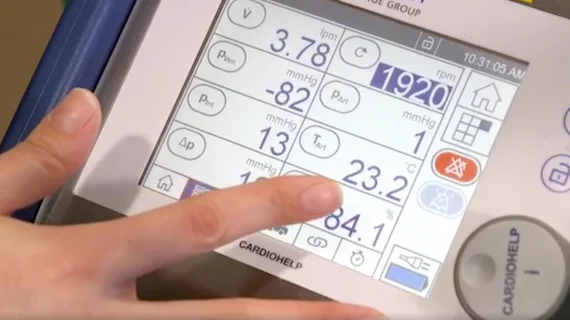Early use of ECMO fails to improve cardiogenic shock outcomes, surprising cardiologists
The immediate use of extracorporeal membrane oxygenation (ECMO) devices is not associated with improved outcomes for patients who present with cardiogenic shock (CS), according to new findings presented at the American Heart Association’s Scientific Sessions 2022 conference in Chicago.
“ECMO is a widely available, minimally invasive, short-term mechanical circulatory support device that enables rapid restoration of circulation and blood flow to organs,” lead author Petr Ostadal, MD, PhD, a professor of medicine in the department of cardiology at Na Homolce Hospital in the Czech Republic, said in a prepared statement. “ECMO is increasingly used for circulatory support in people with CS or cardiac arrest, yet current evidence on the implementation of ECMO to stabilize hemodynamic conditions in these patients remains insufficient.”
Ostadal et al. tracked outcomes from 117 adult CS patients with an average age of 65 years old. Approximately three in four patients were men. Patients were either immediately treated with ECMO or treated with a more conservative approach. Patients in the conservative approach group were still treated with an ECMO device later on if necessary.
Overall, outcomes were similar between the two groups of patients. After 30 days, for example, 64% of patients in the early ECMO group and 71% of patients in the conservative therapy group either died, required cardiac resuscitation or needed additional mechanical circulatory support. The mortality rates and serious adverse event rates were also similar after 30 days for the two groups.
These consistent similarities were not exactly what the researchers thought they would see when they began their analysis.
“We expected to see a significant improvement in outcomes for patients with severe or rapidly progressing CS who underwent early ECMO treatment, and we were surprised to find that immediate use of ECMO was actually not superior to early conservative therapy,” Ostadal said.
The team did note that 39% of patients from the conservative therapy group still needed to be treated with an ECMO device later on. These instances of “bail-out” ECMO did help patients recover when their health was showing signs of worsening, but they also stand as a limitation of the study, the authors explained.

